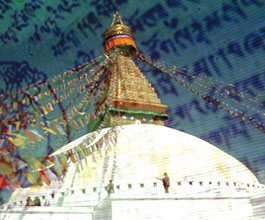|
|
| BANNER HEADLINES: Prayer flags flutter at Boudha on Thursday, the day elections were supposed to be held. Political deadlock has jeopardised the peace agreement signed a year ago this week. |
When ex-US president Jimmy Carter arrived in Kathmandu on Wednesday he could be forgiven for thinking that Nepal is exactly where he left it during his last visit in June.
In fact, things have regressed. The euphoria of the peace accord signed a year ago this week has evaporated. Six months ago, the country was at least looking forward to elections and closure. Now, even polls look uncertain.
We'd all have voted on Thursday if things had gone right. By next week, the first meeting of the constituent assembly would have decided to abolish the monarchy.
It's not hard to see who benefited the most from the postponement of the polls. By constantly coming up with new conditions for elections, the Maoists gave the monarchy breathing space.
This week, Pushpa Kamal Dahal categorically stated that elections were no longer in the Maoist agenda. Indeed, in hindsight it seems that was the plan all along. Resigning from the government in September, announcing a two-month agitation just as the election commission was finalising the logistics of the polls and presenting two proposals in parliament that took 25 days to deliberate when time was running out, were all a lead-up to this.
To be sure, the NC has also been stubborn and is pulled by its own radical rightwing. But at least the NC and UML want polls, and on Wednesday committed themselves to holding it before April. But how are they going to get the Maoists to go along?
The Maoist conditions of parliament abolishing the monarchy before polls and as well as a fully-proportional election, and a brand new set of sub-demands are not the issue. The real sticking point is a gerrymandered power-sharing agreement that would give the Maoists at least 30 percent representation in the constituent assembly.
The house vote, instead of paving the way for elections, has delayed it further, endangering seven-party unity. The winter session of parliament was postponed so the three leaders could come up with a power-sharing formula. As things stand, it doesn't look likely that they can resolve the stalemate by next week.
If Jimmy Carter comes back in April 2008, it\'s likely Nepal will be exactly where he left it this week.



